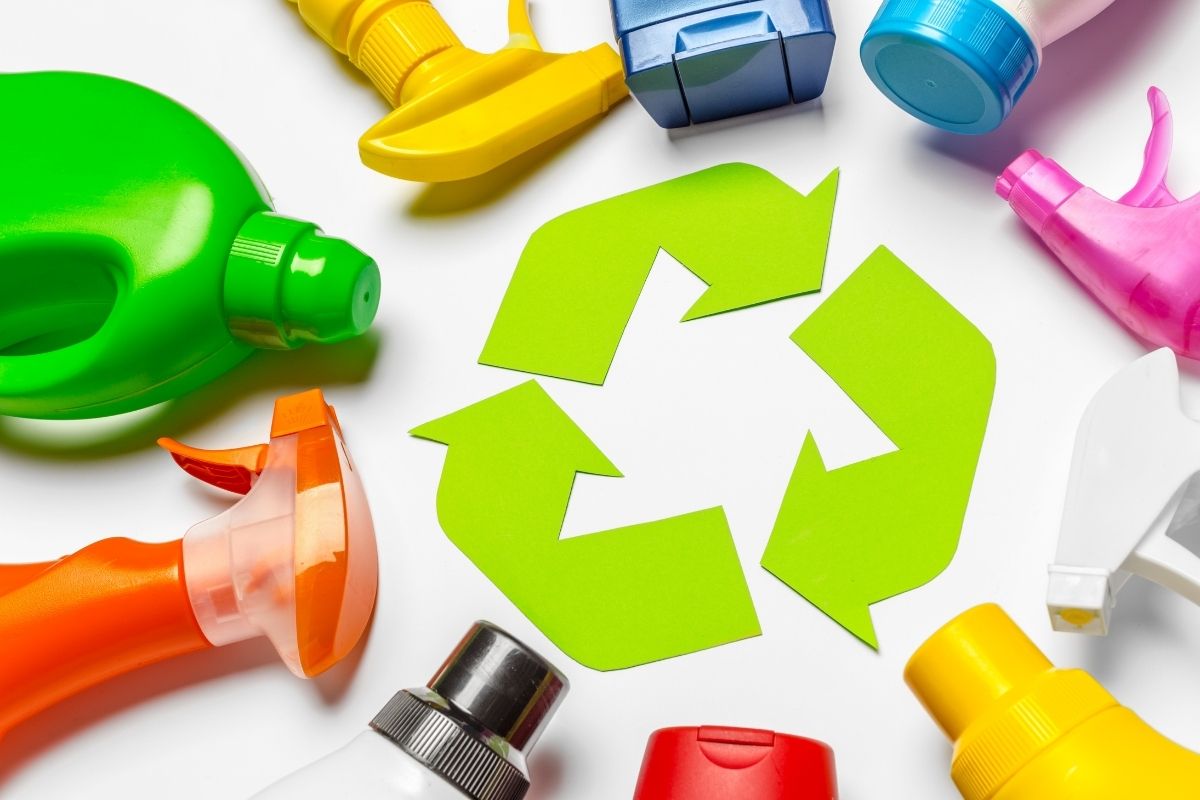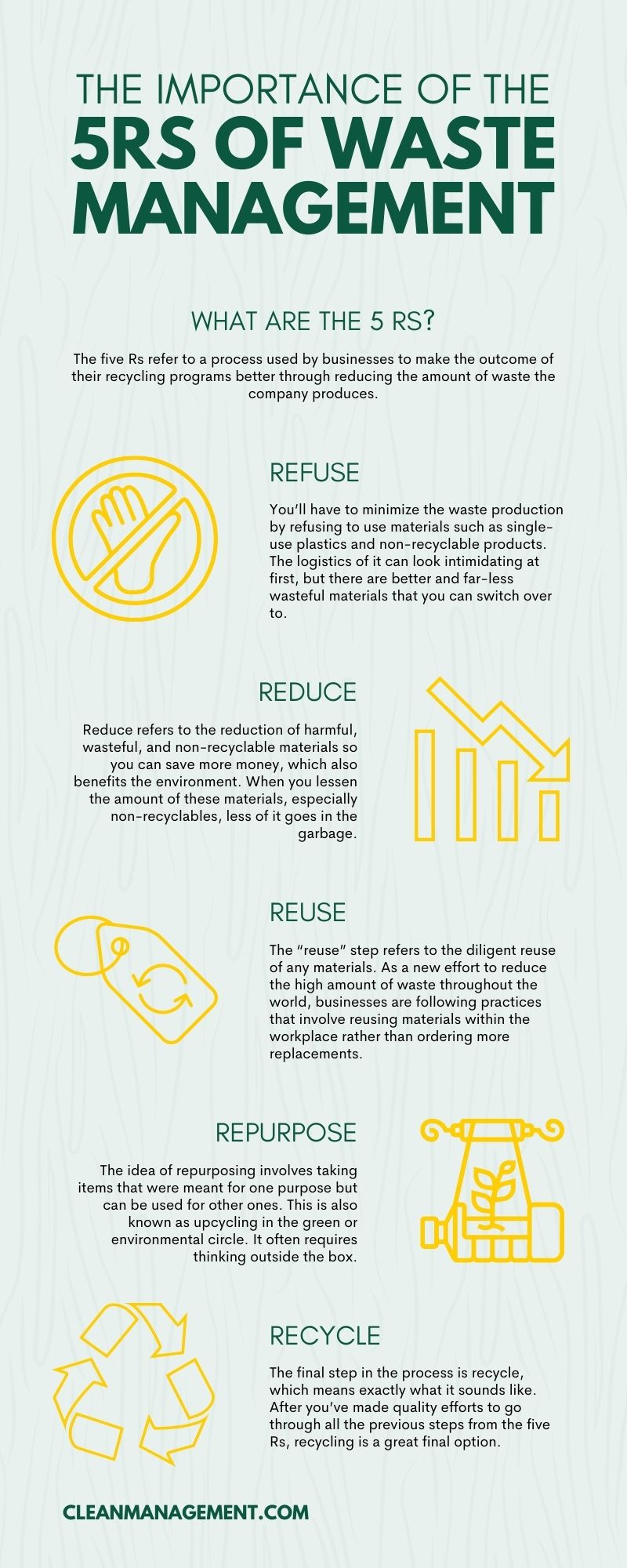The Importance of the 5Rs of Waste Management

When your company is a major waste producer, especially one that produces hazardous waste, it’s important to have a quality waste management plan. One of the most helpful concepts in waste management is following the rule of the five Rs of waste management. This will help you to avoid being wasteful and help you make a more sustainable business. Learn about the importance of the 5 Rs of waste management in our overview below.
What Are the 5 Rs?
It’s important to learn what the five Rs of waste management are in order to understand their importance. The five Rs refer to a process used by businesses to make the outcome of their recycling programs better through reducing the amount of waste the company produces. It’s important for any company that’s a producer of high amounts of waste to use a quality waste management program to keep the environment cleaner and to ensure that all hazardous waste is safely disposed of. A significant part of the process is implementing the steps known as the five Rs. They include refuse, reduce, reuse, repurpose, and recycle. Each of these steps must be followed to every last detail in order for the plan to work to its full potential.
Refuse
The first of the five Rs is refuse. This is important to understand, because this first step can be a difficult practice as it involves refusing a certain amount of waste production for your business. You’ll have to minimize the waste production by refusing to use materials such as single-use plastics and non-recyclable products. The logistics of it can look intimidating at first, but there are better and far-less wasteful materials that you can switch over to. While this is not always easy at first, it’s the most effective way for you to minimize the amount of waste your company is producing. Make sure to work closely with your procurement team so you can establish an effective approach to this step. Look at the vendors you’re working with as well, and avoid taking product packaging that’s extra or unnecessary. A good option to use instead are reusable or returnable containers and packaging. Switching to wiser buying decisions and keeping standards that are more efficient at the beginning of the waste management process will make refusing unnecessary waste much easier.
Reduce
This step is extremely beneficial to the end goal of the process. Reduce refers to the reduction of harmful, wasteful, and non-recyclable materials so you can save more money, which also benefits the environment. When you lessen the amount of these materials, especially non-recyclables, less of it goes in the garbage. All garbage that isn’t deemed hazardous waste will get dumped in a landfill. The more material that gets dumped in the landfill, the quicker it fills, thus requiring more space for garbage storage. This ultimately leads to more negative effects on the environment. When you limit the use of these materials, you are making for a more sustainable future. Try to use the smallest amount of material to lessen the amount of excess waste. A great example of this is printing a document. You can lessen the paper waste by printing double-sided. Think of how to use this kind of concept on a larger scale to apply it to whatever your company produces.
Reuse
The “reuse” step refers to the diligent reuse of any materials. Unfortunately, many companies have fallen into the routine of throwing away completely recyclable material on the basis that it won’t hurt to do it one time. The problem is that this feeling of convenience in the moment leads to a constant habit. It is actually becoming a crisis because the number of plastic products that are being consumed is to a level that’s becoming unsustainable. As a new effort to reduce the high amount of waste throughout the world, businesses are following practices that involve reusing materials within the workplace rather than ordering more replacements. Look through the different equipment, tools, and materials your company uses on a constant basis and opt for using as many compostable or reusable options that are available. After you’ve made strides with what you use within your business, start to focus on how you can implement the same practices for products and materials like packaging, product containers, and any similar items.
Repurpose
Utilizing this step is imperative, especially if you can refuse, reduce, or reuse certain items and materials that will be used in your business. The idea of repurposing involves taking items that were meant for one purpose but can be used for other ones. This is also known as upcycling in the green or environmental circle. It often requires thinking outside the box. Some of the best places to start with this is collecting any packaging such as cardboard boxes and packing material to keep for storing other items from the worksite. Anything you can find another use for is going to help with better waste management. Create a space designated for items that might be able to be reused. You can continue to go through the items in that area and find uses for them as you go along.
Recycle
The final step in the process is recycle, which means exactly what it sounds like. After you’ve made quality efforts to go through all the previous steps from the five Rs, recycling is a great final option. One of the main ways we continue to make efforts to be more environmentally friendly is to recycle anything that has that option. Learning to become a company that values this is a significant part of the importance of the 5 Rs of waste management. There are many businesses that don’t actually practice recycling. If your business is one of these, adopt the process and start by gathering any recyclable materials that are on your worksite. This includes cardboard, paper, plastics, glass, and organics.
You can get started on this process by working with the right environmental waste management company. Clean Management Environmental Group is a full-service waste management company providing environmental and industrial services to the industry. Here, you’ll find a variety of services that will help you to work towards making your business more beneficial to the environment.

